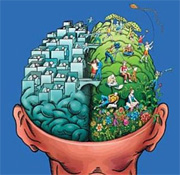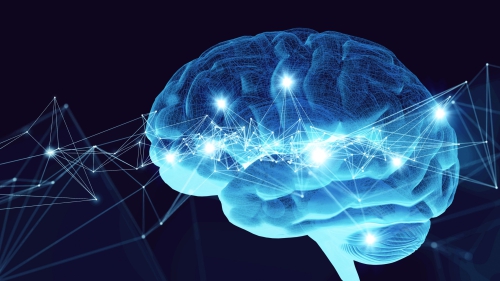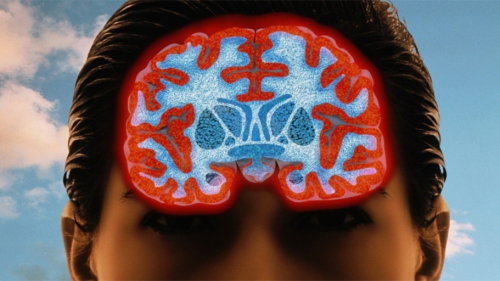The Brain - East Versus West
 |
Richard Nisbett used to be a universalist. Like many cognitive scientists, the University of Michigan professor held that all people--from the Kung tribe that forages in southern Africa to programmers in Silicon Valley--process sensory information the same way. But after visiting Peking University in 1982 and partnering with an Asian researcher, Nisbett found his beliefs challenged.
He embarked on a project to probe the thought processes of East Asians and European Americans. His experiment presented subjects with a virtual aquarium on a computer screen.
"The Americans would say, 'I saw three big fish swimming off to the left. They had pink fins.' They went for the biggest, brightest moving object and focused on that and on its attributes," Nisbett explains. "The Japanese in that study would start by saying, 'Well, I saw what looked like a stream. The water was green. There were rocks and shells on the bottom. There were three big fish swimming off to the left.'"
In other studies Nisbett discovered that East Asians have an easier time remembering objects when they are presented with the same background against which they were first seen. By contrast, context doesn't seem to affect Western recognition of an object.
"I thought there wasn't going to be any difference, and then we kept coming up with these very large differences," says Nisbett, a stately, white-haired man of 67, as we sit in the Upper East Side headquarters of the Russell Sage Foundation. In lieu of his regular salary, he has a grant from Sage to research the nature of intelligence while on sabbatical from Michigan's psychology department, where he has taught since 1971.
Scientists now attach gizmos to people's heads that track eyeball movement; these experiments have confirmed Nisbett's findings, recording that Americans spend more time looking at the featured object in an array while Asians take in the entire scene, darting between background and foreground.
East Asians see things in context, while Westerners focus on the point at hand; the former are dependent, the latter independent; the former are holistic, the latter analytic. There's a social aspect to these differences: Asians are collectivistic, Westerners individualistic.
Even if cognition does differ across cultures, why should we care? For one thing, it might help explain why we're prone to bubbles. In Nisbett's 2003 book The Geography of Thought he describes a study in which students were shown a graph with a line snaking upward across it, representing a trend like world deaths from tuberculosis or the gdp of Brazil. Investigators asked subjects to indicate how they thought the trend would continue. Many Americans sketched a line that continued skyward, while most Chinese forecast a peak and then a decline. A colleague of Nisbett's also showed that while Canadians predict a stock whose value is rising will continue to rise, Chinese think what goes up will come down. An intriguing difference, although one wonders if 1998's pancontinental financial crisis in Asia or the real estate and stock market crash in Tokyo affected students; in the U.S. the Nasdaq crash of 2000--02 was not as memorable. Nisbett doubts the theory but admits "the Confucian idea that the future will resemble the past is deeply ingrained in the Asian mind."
He reasons that cross-cultural differences can also explain societal phenomena. Nisbett defines a nation's preference for lawyers over engineers as a ratio: the number of the former divided by the number of the latter. When he compared America's ratio to Japan's, he found that the U.S. preferred lawyers over engineers 41-to-1. The American system, he says, prizes win-or-lose judgments, while Japan's preference is for middlemen who draft compromises.
In his most recent book, Intelligence and How to Get It: Why Schools and Cultures Count, Nisbett asks why Asian-Americans score higher on the sat than other Americans and why students in Asian nations do so much better on international math and science exams than their U.S. counterparts. The answer is not, Nisbett says, that Asians are smarter. Rather, he writes, "Asian intellectual accomplishment is due more to sweat than to exceptional gray matter." The tests measure proficiency as much as innate skill, and the proficiency comes from cultural forces, such as the Asian sense of obligation to the family. Another factor is that math lessons in Asian schools have a student working out a problem on the board as classmates chime in. That kind of collectivism confirms the commonly held belief that learning by organic induction is more effective than rote memorization.
Why do you find, in a music conservatory, a lot of Asian would-be concert pianists but comparatively few Asian opera-singers-in-training? There's a physical limit to how many hours a day a person can sing, Nisbett says, but not to how many hours one can practice sonatas.
He attributes these differences to history. East Asian agriculture was a communal venture in which tasks like irrigation and crop rotation had citizens acting in concert. In contrast, Western food production led to more lone-operator farmers and herdsmen. Greek democratic philosophy emphasized the individual; the Reformation stressed a personal connection to God; the Industrial Revolution made heroes of entrepreneurs. But in Asia, Confucius said virtue hinged upon appropriate behavior for specific relationships, say, among siblings, neighbors or colleagues.
These tidy generalizations are not without critics. A San Francisco State University professor who edits the Journal of Cross-Cultural Psychology, David Matsumoto, holds that while Nisbett attaches his observations to fascinating raw data, he takes some conclusions too far.
"In cross-cultural work researchers are too quick to come up with some deep, dark, mysterious interpretation of a difference with no data to support it," Matsumoto says. "It's difficult to draw one conclusion [from] a snippet of behavior, and that's what this work tends to do."
Though Nisbett believes our behaviors are shaped by 2,500 years of history, he also thinks they are malleable.
"I got interested in whether you could make people better at reasoning and problem-solving by certain kinds of education, and it turns out you can," he says. If Americans are asked to think about how they are similar to other people they know, they view the aquarium scene more like Asians--and vice versa. "So these things aren't necessarily locked in."
When it comes to cross-cultural business, Nisbett observes, East Asians want to establish relationships, while Westerners tend to keep their business connections at arm's length. Westerners operate by the exact wording of a contract, while East Asians hold that if circumstances change, so should the agreement. Marketers, of course, are aware of cultural differences. For the same phone, Samsung emphasized contrasting messages: In the U.S. the message was "I march to the beat of my own drum," whereas in Korea the ad campaign focused on families staying connected.
But Nisbett noticed shifts within the Asian cohort last year, after he observed a group of Chinese students at a Procter & Gamble focus group.
"My goodness, they were as lively as any group of American graduate students I've ever had. If I said something they didn't agree with, they let me know. ... I would never, ever feel that way with Japanese or Koreans, who are more concerned with harmony," he says. "I think the Chinese will be more successful than the Japanese have been because they have that sense of obligation to family, but they're also going to get this more Western attitude of wanting to succeed as individuals."
Perhaps, Nisbett speculates, the personal drive one sees in Chinese entrepreneurs is a consequence of China's one-child policy. Because two parents and four grandparents dote on an only child, individualism is emphasized more than it used to be. As a result, Chinese youth are moving in a Western direction.
In the last half-century Japan has undergone a huge shift toward democracy, but this hasn't been accompanied by an increase in individualism, Nisbett says: "Japan is evidence that nothing changes. China is evidence that things can change like mad."
Why is Nisbett something of a lone wolf in studying the role of geography in cognition? His answer: "A lot of politically correct academics can't stand to hear about differences. They automatically assume that if you're pointing to difference, you're assuming superiority of your own culture. Well, that's just nonsense."
The upshot of Nisbett's research is that differences are real. They might not always be for the better, but they matter. Perhaps Americans should temper their optimism, Asians their reluctance to take center stage. For it seems to Nisbett that those who will be most successful in the 21st century are the ones who grasp what's best about both worldviews.
Hana R. Alberts is a Reporter at Forbes.
Source: Forbes.com
Related Suggestions
But does it matter?
What matters is how good and sincere we are to our own selves- are we on the right path in search of truth, or are we knowingly or inadvertently deluding ourselves....













